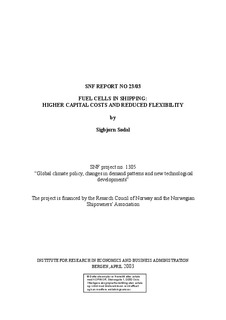| dc.contributor.author | Sødal, Sigbjørn | |
| dc.date.accessioned | 2006-06-23T08:59:51Z | |
| dc.date.available | 2006-06-23T08:59:51Z | |
| dc.date.issued | 2003-04 | |
| dc.identifier.isbn | 82-491-0280-0 (trykt versjon) | |
| dc.identifier.issn | 0803-4036 | |
| dc.identifier.uri | http://hdl.handle.net/11250/164545 | |
| dc.description.abstract | This paper discusses some main economic characteristics of fuel cell power production technology applied to shipping. Whenever competitive fuel cell systems enter the market, they are likely to have higher capital costs and lower operating costs than systems based on traditional combustion technology. Implications of the difference are investigated with respect to investment flexibility by the use of a real options model of ship investment, lay-up and scrapping decisions under freight rate uncertainty. A higher capital share of total expected costs can represent a significant opportunity cost in uncertain markets. The paper highlights the significance of accounting properly for value of flexibility prior to investment in new technology. | en |
| dc.format.extent | 198455 bytes | |
| dc.format.mimetype | application/pdf | |
| dc.language.iso | eng | en |
| dc.publisher | SNF | en |
| dc.relation.ispartofseries | Report | en |
| dc.relation.ispartofseries | 2003:23 | en |
| dc.subject | fuel cells | en |
| dc.subject | maritime transport | en |
| dc.subject | price uncertainty | en |
| dc.subject | flexibility | en |
| dc.title | Fuel cells in shipping : higher capital costs and reduced flexibility | en |
| dc.type | Research report | en |
